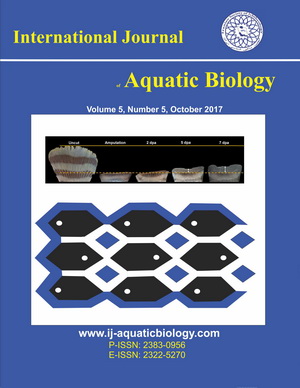Effects of cultural conditions on life history characteristics of the freshwater rotifer Brachionus calyciflorus
Downloads
The effects of temperature, food concentration, and pH conditions on the life history characteristics of the freshwater rotifer, Brachionus calyciflorus, were investigated. The culture temperature (20, 25, and 30°C) had a significant relationship with life history parameters. At lower temperatures, there was a prolongation of the mean lifespan and juvenile period. The optimal temperature for the fecundity of this species was 25°C with an average quantity of 23.67±6.99 offspring female-1 across the entire lifespan of 6.7 days. No significant difference was found between the mean lifespan at different algae densities but the maximum fecundity (25.75±6.99 offspring female-1) was obtained at an algae density of 10x106 cells.ml-1. Brachionus calyciflorus could tolerate a broad range of pH (4-10) but preferred pH from 6-10. These results are critical for potential applications of this species in ecotoxicology, biomonitoring as well as in mass culture as live food for larval rearing in aquaculture.
Downloads
Awaïss A., Kestemont P (1992). An investigation into the mass production of the freshwater rotifer Brachionus calyciflorus Pallas. 2. Influence of temperature on the population dynamics. Aquaculture, 105: 337-344.
Baruah B.K., Baruah D., Das M. (1996). Study on the effect of paper mill effluent on the water quality of receiving wetland. Pollution Research, 15: 389-393.
Becks L., Agrawal A.F. (2012). The evolution of sex is favored during adaptation to new environments. PLOS Biology, 10(5): e1001317.
Birky C.W., Gilbert J.J. (1971). Parthenogenesis in rotifers: the control of sexual and asexual reproduction. American Zoologist, 11(2): 245-266.
Cong P.T., Anh H.T.L., Hong D.D. (2019). Utilization of Schizochytrium mangrovei PQ6 as feed for rotifer Brachionus plicatilis in rearing black sleeper’s larvae (Bostrichthys sinensis, Lacepede, 1881). Academia Journal of Biology, 41(2).
Cruciani V., Iovine C., Thomé J.P., Joaquim-Justo C. (2016). Impact of three phthalate esters on the sexual reproduction of the Monogonont rotifer, Brachionus calyciflorus. Ecotoxicology, 25: 192-200.
Dang NT, Ho TH (2002). Hydrobiology of Viet Nam’s inland freshwater bodies. Publ. House Sci. Technology Ha Noi Viet Nam. 399 p.
Declerck S.A., Malo A.R., Diehl S., Waasdorp D., Lemmen K.D., Proios K., Papakostas S. (2015). Rapid adaptation of herbivore consumers to nutrient limitation: Eco-evolutionary feedbacks to population demography and resource control. Ecology Letters, 18(6): 553-562.
Duong-Quang H., Vo V.M., Phan N.T., Tran-Nguyen Q.A., Trinh-Dang M. (2020). Diversity of rotifers in different habitats in the sandy coast of Quang Nam province. Proceeding 4th Natl. Sci. Conf. Biol. Res. Teach. Vietnam, 158-167.
Gilbert J.J. (1985). Competition between rotifers and Daphnia. Ecology, 66: 1943-1950.
Gilbert J.J. (1974). Dormancy in rotifers. Transactions of the American Microscopical Society, 490-513.
Guo R., Snell T.W., Yang J. (2011). Ecological strategy of rotifer (Brachionus calyciflorus) exposed to predator-and competitor-conditioned media. Hydrobiologia, 658: 163-171.
Han J., Kim D.H., Kim H.S., Kim H.J., Declerck S.A., Hagiwara A., Lee J.S. (2018). Genome-wide identification of 31 cytochrome P450 (CYP) genes in the freshwater rotifer Brachionus calyciflorus and analysis of their benzo [?] pyrene-induced expression patterns. Comparative Biochemistry and Physiology Part D: Genomics and Proteomics, 25: 26-33.
Ismail A.H., Adnan A.A.M. (2016). Zooplankton composition and abundance as indicators of eutrophication in two small man-made lakes. Tropical Life Sciences Research, 27: 31.
Jensen T.C., Verschoor A.M. (2004). Effects of food quality on life history of the rotifer Brachionus calyciflorus Pallas. Freshwater Biology, 49(9): 1138-1151.
Kauler P., Enesco H.E. (2011). The effect of temperature on life history parameters and cost of reproduction in the rotifer Brachionus calyciflorus. Journal of Freshwater Ecology, 26(3): 399-408.
Kim H.S., Lee B.Y., Han J., Jeong C.B., Hwang D.S., Lee M.C., Kang H.M., Kim D.H., Kim H.J., Papakostas S. (2018). The genome of the freshwater monogonont rotifer Brachionus calyciflorus. Molecular Ecology Resources, 18(3): 646-655.
Le D.V., Nguyen P.N., Dierckens K., Nguyen D.V., De Schryver P., Hagiwara A., Bossier P. (2017). Growth performance of the very small rotifer Proales similis is more dependent on proliferating bacterial community than the bigger rotifer Brachionus rotundiformis. Aquaculture, 476: 185-193.
Liang Y., Ouyang K., Chen X., Su Y., Yang J. (2017). Life strategy and grazing intensity responses of Brachionus calyciflorus fed on different concentrations of microcystin-producing and microcystin-free Microcystis aeruginosa. Scientific Reports, 7(1): 1-12.
Lim L.C., Wong C.C. (1997). Use of the rotifer, Brachionus calyciflorus Pallas, in freshwater ornamental fish larviculture. Hydrobiologia, 358: 269-273.
Lubzens E. (1987). Raising rotifers for use in aquaculture, in: Rotifer Symposium IV. Springer. pp: 245-255.
Mitchell S.A. (1992). The effect of pH on Brachionus calyciflorus Pallas (Rotifera). Hydrobiologia, 245: 87-93.
Mitchell S.A., Joubert J.H.B. (1986). The effect of elevated pH on the survival and reproduction of Brachionus calyciflorus. Aquaculture, 55: 215-220.
Nhi N.H.Y., Hanh N.T.B., Lan T.T. (2020). Culturing tiny rotifer Brachionus angularis with Chlorella. Livestock Research for Rural Development, (32): 79.
Nogueira M.G. (2001). Zooplankton composition, dominance and abundance as indicators of environmental compartmentalization in Jurumirim Reservoir (Paranapanema River), São Paulo, Brazil. Hydrobiologia, 455: 1-18.
Paez M.E.C. (1991). The population growth of a rotifer Brachionus plicatilis and life history of amictic females. Nippon Suisan Gakkaishi, 57: 1629-1634.
Pal S., Patra A.K., Chakraborty K. (2015). Prospect of Brachionus calyciflorus, a holoplankton, for its potential bio-indicator property: A review. International Journal of Recent Science Research, 6: 7603-7608.
Pallas P.S. (1766). Elenchus zoophytorum sistens generum adumbrationes generaliores et specierum cognitarum succintas descriptiones, cum selectis auctorum synonymis. Apud Petrum van Cleef.
Papakostas S., Michaloudi E., Proios K., Brehm M., Verhage L., Rota J., Peña C., Stamou G., Pritchard V.L., Fontaneto D. (2016). Integrative taxonomy recognizes evolutionary units despite widespread mitonuclear discordance: evidence from a rotifer cryptic species complex. Systematic Biology, 65: 508-524.
Peltier W.H., Weber C.I. (1985). Methods for measuring the acute toxicity of effluents to freshwater and marine organisms.
Phan D.D., Le N.N. (2012). Diversity on Rotifera species competitions in fresh inland waters of Southern Vietnam and some new records for zooplankton fauna of Vietnam. Academia Journal of Biology, 34(3se): 13-20.
Pourriot R., Snell T.W. (1983). Resting eggs in rotifers, in: Biology of Rotifers. Springer, 213-224.
Quy O.M., Fotedar R., Thy H.T.T. (2018). Extension of rotifer (Brachionus plicatilis) inclusions in the larval diets of mud crab, Scylla paramamosain (Estampodor, 1949): effects on survival, growth, metamorphosis and development time. Applied Mathematical Modelling 12: 65-74.
R Core Team (2020). R: A language and environment for statistical computing. Vienna, Austria: R Foundation for statistical computing. Retrieved from https:// www.R-project.org/.
Rico-Martínez R., Dodson S.I. (1992). Culture of the rotifer Brachionus calyciflorus Pallas. Aquaculture, 105: 191-199.
Rufchaie R., Chubian F., Pajand Z., Ershad L.H., Hadadi M.K. (2010). Study on the changes of size in Brachionus calyciflorus using different diets. Iranian Journal of Biology, 22: 599-607.
Scheuerl T., Stelzer C.P. (2013). Patterns and dynamics of rapid local adaptation and sex in varying habitat types in rotifers. Ecology and Evolution, 3(12): 4253-4264.
Shirota A (1966). The plankton of South Viet-Nam: fresh water and marine plankton. Overseas Technical Cooperation Agency.
Snell T.W., Carmona M.J. (1995). Comparative toxicant sensitivity of sexual and asexual reproduction in the rotifer Brachionus calyciflorus. Environmental Toxicology and Chemistry: An International Journal, 14(3): 415-420.
Snell T.W., Moffat B.D. (1992). A 2-d life cycle test with the rotifer Brachionus calyciflorus. Environmental Toxicology and Chemistry: An International Journal, 11(9): 1249-1257.
Trinh-Dang M., Segers H, Sanoamuang L.O. (2015). Psammon rotifers in Central Vietnam, with the descriptions of three new species (Rotifera: Monogononta). Zootaxa, 4018: 249-265.
Trinh-Dang M., Van Vo M., Tran A.N.Q., Le H.N.T, Tran S.N (2019). Species diversity of rotifers (Rotifera: Eurotatoria) of Phu Ninh Lake with five new records from Vietnam. International Journal of Aquatic Biology, 7(1): 38-44.
Vu N.U., Pham T.H., Huynh P.V., Huynh T.G. (2021). Importance of the freshwater rotifer Brachionus angularis for improved survival rate of early life-history stages of pangasius catfish, Pangasianodon hypophthalmus. Aquaculture Research, 52(2): 783-792.
Wallace R.L., Snell T.W., Ricci C., Thomas N. (2006). Rotifera. 1, Biology, Ecology and Systematics. Backhuys Publishers. 299 p.
Walz N. (1983). Individual culture and experimental population dynamics of Keratella cochlearis (Rotatoria). Hydrobiologia, 107: 35-45.
Wang X.L., Xiang X.L., Xia M.N., Han Y., Huang L., Xi Y.L. (2014). Differences in life history characteristics between two sibling species in Brachionus calyciflorus complex from tropical shallow lakes. In Annales de Limnologie-International Journal of Limnology, 50(4): 289-298.
Xi Y.L., Huang X.F., Jin H.J. (2001). Life history characteristics of three types of females in Brachionus calyciflorus Pallas (Rotifera) fed different algae. Hydrobiologia, 446: 95-98.
Xi Y.L., Liu G.Y., Jin H.J. (2002). Population growth, body size, and egg size of two different strains of Brachionus calyciflorus Pallas (Rotifera) fed different algae. Journal of Freshwater Ecology, 17(2): 185-190.
Xiang X.L., Chen Y.Y., Han Y., Wang X.L., Xi Y.L. (2016). Comparative studies on the life history characteristics of two Brachionus calyciflorus strains belonging to the same cryptic species. Biochemical Systematics and Ecology, 69: 138-144.
Xiang X.L., Xi Y.L., Zhang J.Y., Ma Q., Wen X.L. (2010). Effects of temperature on survival, reproduction, and morphotype in offspring of two Brachionus calyciflorus (Rotifera) morphotypes. Journal of Freshwater Ecology, 25(1): 9-18.
Xue Y.H., Yang X.X., Zhang G., Xi Y.L. (2017). Morphological differentiation of Brachionus calyciflorus caused by predation and coal ash pollution. Scientific reports, 7(1): 1-8.
Yin X.W., Niu C.J. (2008). Effect of pH on survival, reproduction, egg viability and growth rate of five closely related rotifer species. Aquatic Ecology, 42(4): 607-616.
Zhdanova S.M. (2011). The species composition of rotifers in the water reservoirs of Central Vietnam. Inland Water Biology, 4(4): 425-434.
Copyright (c) 2023 International Journal of Aquatic Biology

This work is licensed under a Creative Commons Attribution 4.0 International License.








